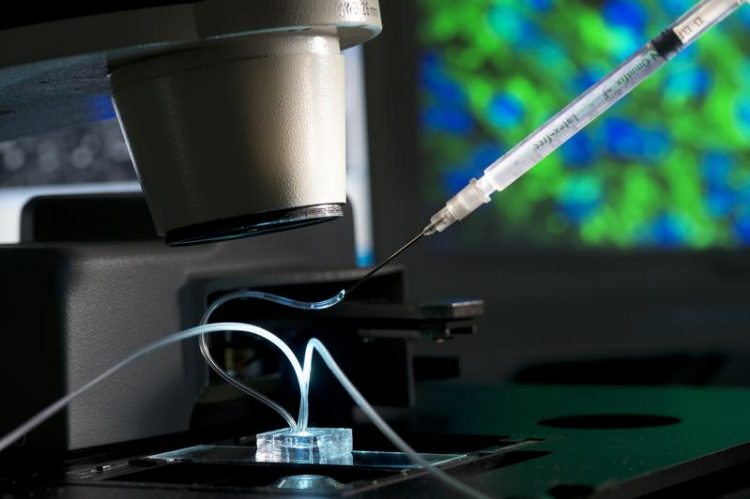Fraunhofer IGB joins international consortium to advance organ-on-a-chip technology in Europe

Microphysiological organ-on-a-chip system. Fraunhofer IGB
The consortium’s aim is to accelerate the societal and economic impact of organ-on-a-chip technology through coordinated action. Organs-on-chips combine human mini-organs with microelectronics, microfluidics and nanosensors.
This technology is already providing new platforms for drug discovery but is poised to deliver applications in personalized medicine and safety pharmacology, and offers alternatives to conventional animal testing. Over the next two years, the EU will invest 0.5 million Euros in the ORgan-on-CHip In Development (ORCHID) project.
ORCHID will facilitate dialogue and documentation towards accelerating the development of prototypes of organs-on-chips, validated cell systems that mimic diseased or healthy human tissue, and implementation of this technology by a broad group of potential users in science, health care and industry.
Within the consortium, the Fraunhofer IGB will focus on the economic and educational aspects of the ORCHID project. Dr. Peter Loskill, head of the institute’s research group on organ-on-a-chip systems, and his team will evaluate which skills are essential for the development and application of organ-on-a-chip technology.
On this basis, it is possible to identify specific training contents for the further education of researchers, developers, and users. A further task of Dr. Loskill and his team will be the assessment of suitable business models for the commercialization of organ-on-a-chip systems, taking advantage of the extensive economic expertise of the Fraunhofer IGB as an application-oriented research institute.
Ultimately, ORCHID will build an infrastructure for scientists, policy makers, funders and end-users to join the decision-making processes that will direct future European developments in organ-on-a-chip applications. An essential contribution of ORCHID will be the establishment of a digital platform enabling knowledge sharing between researchers and representatives of private corporations including insurance companies, pharmaceutical and biotech companies, food industry, health foundations and patient organizations.
The ORCHID platform will provide overviews and updates of current and new organ-on-a-chip initiatives so that users can track progress easily, consult developers directly and identify gaps in present knowledge, limiting implementation. ORCHID will also address ethical and regulatory issues, particularly concerning personalized information, economic and societal impact, training of researchers, and the design of an R&D roadmap.
The consortium is composed of the following organizations:
– Leiden University Medical Center, the Netherlands; coordinator contact: Christine Mummery, PhD, Professor of Developmental Biology, Chair Dept. of Anatomy
– Organ-on-Chip consortium hDMT, the Netherlands; strategy and the roadmap contact: Janny van den Eijnden van Raaij, PhD, Managing director
– Fraunhofer IGB, Germany; Peter Loskill, PhD, Attract Group Manager Organ-on-a-chip, Department of Cell and Tissue Engineering
– CEA LETI, France; eco-system development and the digital platform contact: Adrienne Pervès PhD, Deputy Head of Department-LETI-Technologies for biology and health
– Imec, Belgium; ethical aspects, regulation and standardization contact: Wolfgang Eberle, PhD, Funded Program Manager Smart Health and NERF Coordinator EIT Health
– University of Zaragoza, Spain; dissemination contact: Luis Fernandez, PhD, Professor Mechanical Engineering, Dept. of Applied Mechanics and Bioengineering
This project has received funding from the European Union’s Horizon 2020 research and innovation programme under grant agreement No 766884
https://www.igb.fraunhofer.de/en/press-media/press-releases/2017/orchid.html
Media Contact
All latest news from the category: Life Sciences and Chemistry
Articles and reports from the Life Sciences and chemistry area deal with applied and basic research into modern biology, chemistry and human medicine.
Valuable information can be found on a range of life sciences fields including bacteriology, biochemistry, bionics, bioinformatics, biophysics, biotechnology, genetics, geobotany, human biology, marine biology, microbiology, molecular biology, cellular biology, zoology, bioinorganic chemistry, microchemistry and environmental chemistry.
Newest articles

Security vulnerability in browser interface
… allows computer access via graphics card. Researchers at Graz University of Technology were successful with three different side-channel attacks on graphics cards via the WebGPU browser interface. The attacks…

A closer look at mechanochemistry
Ferdi Schüth and his team at the Max Planck Institut für Kohlenforschung in Mülheim/Germany have been studying the phenomena of mechanochemistry for several years. But what actually happens at the…

Severe Vulnerabilities Discovered in Software to Protect Internet Routing
A research team from the National Research Center for Applied Cybersecurity ATHENE led by Prof. Dr. Haya Schulmann has uncovered 18 vulnerabilities in crucial software components of Resource Public Key…





















